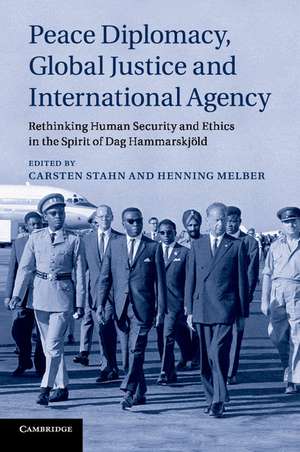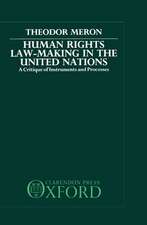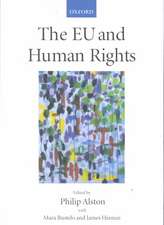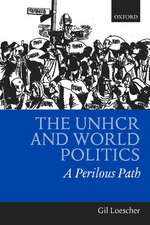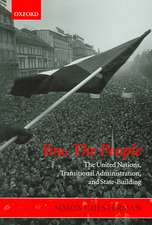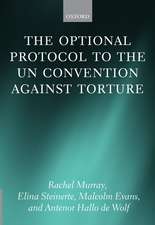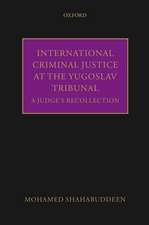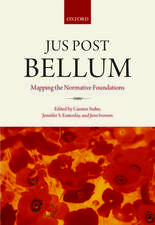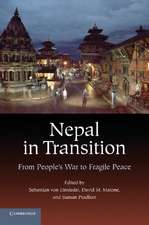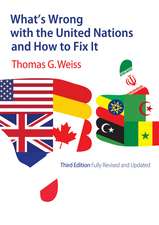Peace Diplomacy, Global Justice and International Agency: Rethinking Human Security and Ethics in the Spirit of Dag Hammarskjöld
Editat de Carsten Stahn, Henning Melberen Limba Engleză Paperback – 22 iun 2016
Preț: 435.92 lei
Nou
Puncte Express: 654
Preț estimativ în valută:
83.41€ • 90.89$ • 70.29£
83.41€ • 90.89$ • 70.29£
Carte tipărită la comandă
Livrare economică 23 aprilie-07 mai
Preluare comenzi: 021 569.72.76
Specificații
ISBN-13: 9781316603420
ISBN-10: 1316603423
Pagini: 638
Ilustrații: 1 b/w illus.
Dimensiuni: 152 x 228 x 34 mm
Greutate: 0.84 kg
Editura: Cambridge University Press
Colecția Cambridge University Press
Locul publicării:Cambridge, United Kingdom
ISBN-10: 1316603423
Pagini: 638
Ilustrații: 1 b/w illus.
Dimensiuni: 152 x 228 x 34 mm
Greutate: 0.84 kg
Editura: Cambridge University Press
Colecția Cambridge University Press
Locul publicării:Cambridge, United Kingdom
Cuprins
1. Human security and ethics in the spirit of Dag Hammarskjöld: an introduction Carsten Stahn and Henning Melber; Part I. Reflections on Dag Hammarskjöld: 2. Dag Hammarskjöld and the twenty-first century Kofi Annan; 3. A beacon of hope: Dag Hammarskjöld and the United Nations Brian Urquhart; 4. Dag Hammarskjöld, 1905–61: a remarkable man, a remarkable Secretary-General Pieter Kooijmans; 5. Dag Hammarskjöld, the United Nations and the Rule of Law in today's world Hans Corell; Part II. Hammarskjöld's intellectual legacy and leadership: 6. Dag Hammarskjöld and the politics of hope Monica Bouman; 7. Dag Hammarskjöld's spirituality and the quest for negotiated peace, reconciliation and meaning Paul R. Nelson; 8. From the unwritten manual: Dag Hammarskjöld's political wisdom Roger Lipsey; 9. Hammarskjöld's dynamic approach to the UN Charter and international law Ove Bring; 10. Hammarskjöld, economic thinking, and the United Nations Anne Orford; Part III. Hammarskjöld, the UN and the Congo: 11. Dag Hammarskjöld and the Congo Crisis, 1960–1 Maria Stella Rognoni; 12. Continuities of violence in the Congo: legacies of Hammarskjöld and Lumumba Helen M. Hintjens and Serena Cruz; 13. Lumumba v. Hammarskjöld: a story of confrontation Jean Omasombo Tshonda; 14. Dag Hammarskjöld and Africa's decolonisation Henning Melber; 15. The Dag factor: how quiet diplomacy changed the role of the Secretariat during the Congo Crisis, 1960–1 Alanna O'Malley; Part IV. The Role of the UN Secretary-General: 16. The 'Suez story': Dag Hammarskjöld, the United Nations and the creation of UN peacekeeping Manuel Fröhlich; 17. Breaking free: Dag Hammarskjöld, good offices and heads of international organisations Aoife O'Donoghue; 18. Dag Hammarskjöld's diplomacy: lessons learned Peter Wallensteen; 19. Visions of international life: from Hammarskjöld to Annan and beyond Jan Anne Vos; 20. EU global peace diplomacy: institutional framework Steven Blockmans; Part V. Re-thinking Internationalism: Intervention, Responsibility and the Politics of R2P: 21. From 'conference machinery' to 'global administration'? International executive authority beyond Hammarskjöld Carsten Stahn; 22. Hammarskjöld and international executive rule: a third world perspective on international law Vijayashri Sripati; 23. Who cares?: Dag Hammarskjöld and the limits of responsibility in international law J. Craig Barker; 24. Libya, intervention and responsibility: the dawn of a new era? Francis Kofi Abiew and Noemi Gal-Or; 25. The Arab Spring and the rise and fall of international human rights Louise Arbour; Part VI. Hammarskjöld's Credo: Annex I. The Secretary-General's Annual Report to the General Assembly of the United Nations, Introduction, 17 August 1961; Annex II. Address Given by the Secretary-General, Mr Dag Hammarskjöld, on the Occasion of Staff Day, General Assembly Hall, 8 September 1961.
Recenzii
'This book's many contributors, more than 20 in all, provide a fitting tribute and an objective analysis of Dag Hammarskjöld's achievements as the second UN Secretary-General.' Stephen Williams, African Business
'… a major collection of reflections on Hammarskjöld's intellectual and international political legacy by a cross-disciplinary team of top-flight reflective practitioners (Annan, Brian Urquhart, Hans Corell) and engaged scholars.' Ramesh Thakur, International Affairs
'What a feast of a book this is! … this is a tribute commensurate to the legendary status of the late UN Secretary-General Dag Hammarskjöld (1905–61), whose lofty ideas, practical initiatives and suspicious death did a lot to shape the United Nations during the Cold War years and through to the present day.' Georgios Kostakos, Academic Council on the United Nations System (acuns.org)
'Peace Diplomacy, Global Justice and International Agency promises to examine Hammarskjöld's approach towards international civil service, agency and value-based leadership from a range of disciplinary standpoints.' Guy Fiti Sinclair, European Journal of International Law
'In this paper, the reader can find in-depth analyses of aspects of the Swedish diplomat's thinking, as well as evocations of Dag Hammarskjöld. … The broad introductory study, signed by the editors …, presents the main points of Hammarskjöld's thinking, highlighting his contribution to the resolution of crises such as the Congolese one, reviewing briefly the academic literature dedicated to him and providing a detailed presentation of the elements that made up his credo.' Iuliu-Marius Morariu, translated from Astra Salvensis - Review of History and Culture IV
'… a major collection of reflections on Hammarskjöld's intellectual and international political legacy by a cross-disciplinary team of top-flight reflective practitioners (Annan, Brian Urquhart, Hans Corell) and engaged scholars.' Ramesh Thakur, International Affairs
'What a feast of a book this is! … this is a tribute commensurate to the legendary status of the late UN Secretary-General Dag Hammarskjöld (1905–61), whose lofty ideas, practical initiatives and suspicious death did a lot to shape the United Nations during the Cold War years and through to the present day.' Georgios Kostakos, Academic Council on the United Nations System (acuns.org)
'Peace Diplomacy, Global Justice and International Agency promises to examine Hammarskjöld's approach towards international civil service, agency and value-based leadership from a range of disciplinary standpoints.' Guy Fiti Sinclair, European Journal of International Law
'In this paper, the reader can find in-depth analyses of aspects of the Swedish diplomat's thinking, as well as evocations of Dag Hammarskjöld. … The broad introductory study, signed by the editors …, presents the main points of Hammarskjöld's thinking, highlighting his contribution to the resolution of crises such as the Congolese one, reviewing briefly the academic literature dedicated to him and providing a detailed presentation of the elements that made up his credo.' Iuliu-Marius Morariu, translated from Astra Salvensis - Review of History and Culture IV
Descriere
This critical review of Hammarskjöld's legacy as Secretary-General explores the contemporary relevance of his international civil service, agency and leadership.
